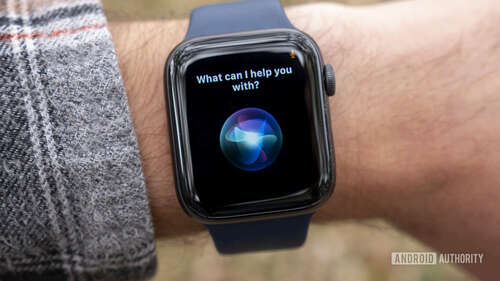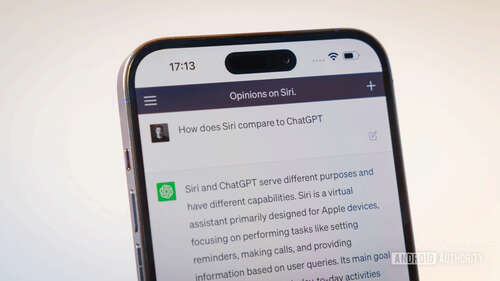
Dhruv Bhutani / Android Authority
When Apple launched the iPhone 4S in 2011, Siri quickly became one of the phone’s headlining features as it was one of the first voice assistants ever released. Unlike simple voice recognition on previous iPhone models that could only perform basic tasks, Siri could deliver the weather, set calendar appointments, and even respond to a handful of philosophical questions. Siri has gained capabilities over the years but the recent releases of AI services like ChatGPT and Google Bard have left it behind somewhat. So with that in mind, is Siri an AI? Let’s break it down.
Is Siri an AI?

Edgar Cervantes / Android Authority
Yes, Siri is an AI in the sense that it attempts to emulate human intelligence. However, it’s important to understand that we don’t judge artificial intelligence on a single metric. Siri passes one of the most basic requirements of AI: the ability to communicate in natural languages like English. It can also understand and respond in speech, another feature that we typically associate with AI.
Siri lacks some qualities required for true artificial intelligence.
Having said that, Siri has various inherent limitations that prevent it from understanding complex questions or responding in a way that a human would. For example, you can ask it to perform a simple math problem or currency conversion. However, Siri is not an AI that can perform this task on its own. Instead, it relies on a set of arithmetic algorithms similar to a calculator, which most people wouldn’t consider an example of AI these days.
In today’s world, older chatbots like Siri would fall under the category of narrow or weak AI. In other words, it shows limited signs of human intelligence and can only perform a small number of tasks. Apple could change how Siri works in the future but it pales in comparison to newer services like ChatGPT and Microsoft Copilot for now.
How does Siri work? Does it use machine learning?

Jimmy Westenberg / Android Authority
Siri uses a combination of voice recognition, natural language processing (NLP) AI tech, and machine learning-based algorithms to handle common tasks. Let’s go through each one in more detail:
- Voice recognition: This may seem self-explanatory, but it’s a surprisingly complex problem as Siri has to handle a range of languages and accents from all over the world. Apple used machine learning to train a speech recognition model that can handle these edge cases.
- Natural language processing (NLP): Early chatbots could only respond to a set of queries, like “What is the weather?” Siri can handle a slightly broader set, thanks to a branch of AI called natural language processing (NLP). You can ask questions like “Will it rain tomorrow?” and end up with the same weather forecast. When Siri first released, this was relatively new tech and regarded as a cutting-edge example of AI.
- Task execution: Siri is currently incapable of thinking like a human, and instead relies on predefined algorithms for common tasks like arithmetic or setting reminders on your device. Apple likely uses machine learning for some tasks but it’s a far cry from being all-encompassing. There are still hundreds of tasks you cannot ask Siri to perform, like accessing a random third-party app on your phone or Mac.
The final task execution stage is where we’d judge the capabilities of an AI and Siri ultimately falls short. It doesn’t emulate human intelligence and certainly cannot code or solve math problems without outside help. Likewise, it cannot generate images or recognize objects in an image like a human would.
In summary then, Siri incorporates some facets of AI but cannot be wholly defined as an AI. That’s especially true now that generative AI chatbots like ChatGPT have come along that show emergent intelligence properties.
When will Siri become an AI?

Robert Triggs / Android Authority
Siri has received minor improvements over the past decade, but its primary use cases haven’t changed much. The competition has become a lot more serious in that time. Google’s Assistant with Bard, for example, fuses the search giant’s Siri rival with generative AI. This will allow the new Google Assistant to converse on a range of different subjects and respond more like a human.
While Apple hasn’t announced a similar AI push for Siri just yet, Bloomberg and 9To5Mac have found evidence that the company has started working on it internally. Code references point to Siri using generative AI to suggest replies in the Messages app and summarize a given piece of text. These are features we’ve seen in Samsung’s Galaxy AI and Google’s Pixel series so it’s possible that the next generation iPhone will match it as well.
Apple faces tough competition in the smartphone space, thanks to AI.
While generative AI models offer much more advanced functionality than Siri in its current state, it does have a few downsides. When ChatGPT first released, it was prone to hallucinating or responding with incorrect information. Things have improved since, but it’s still a risk inherent to large language models like GPT-4. It’ll be interesting to see Apple’s approach to this problem as the company likes to avoid risk and only embrace mature technologies. That said, competition from Google, Samsung, and other smartphones may force Apple to embrace the modern AI paradigm.

